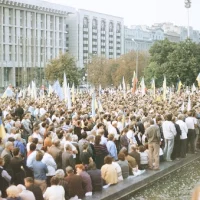Romania in the 1970s was a study in contrasts. Traditionally a rich agricultural breadbasket, its backward economy could not provide enough food for its inhabitants. A despotic, communist dictatorship, it still enjoyed a close relationship with the United States, as Secretary of State Henry Kissinger used Nicolae Ceausescu, who ruled Romania from 1967 to 1989,… Read More "Life in Ceausescu’s Romania"
The Search for Peace in Southern Africa – Oil, Angola, and the Proxy Wars
During the Cold War, the United States and the USSR engaged in a zero-sum game throughout the globe; while mutually assured destruction prevented the two nuclear superpowers from fighting a hot war, they did conduct an extensive war of proxies on nearly every continent. In the 1970s, just as Saigon – and American influence in… Read More "The Search for Peace in Southern Africa – Oil, Angola, and the Proxy Wars"
The 1974 Turkish Intervention in Cyprus
The “Cyprus problem” of ongoing conflict between the Greeks and Turks on the Mediterranean island of Cyprus came to a head in July 1974 when a Greek-backed coup d’état on July 15 prompted a Turkish intervention five days later. In the spring of 1974, President of Cyprus Archbishop Makarios III learned of plans for a… Read More "The 1974 Turkish Intervention in Cyprus"
The Whistle-Blower: Daniel Ellsberg and the Pentagon Papers
“We were young, we were foolish, we were arrogant, but we were right.” —Daniel Ellsberg The recent issue of NSA surveillance and the revelations made by Edward Snowden have drawn comparisons with another prominent whistle-blower – Daniel Ellsberg. Starting June 13th, 1971, the New York Times printed a series of leaked government documents, detailing the… Read More "The Whistle-Blower: Daniel Ellsberg and the Pentagon Papers"
“With Ukraine, Russia is an empire. Without it, Russia is just another country.” The history between these two is long and often fraught with conflict. Before the current protests in Ukraine over relations with Russia, Ukraine had to fight to free itself from the Soviet Union. Official independence was declared August 24, 1991 and with… Read More "Ukraine’s Push for Independence"
“The First Terrorist Attack in the U.S.” – The Letelier-Moffitt Assassinations
After Augusto Pinochet led a coup d’état in Chile on September 11, 1973, taking power from the democratically elected President Salvador Allende, he exiled Allende’s Foreign Minister, Orlando Letelier. After Letelier sought asylum in the United States, Pinochet believed he was acting as an informant to the U.S. government. Consequently, he was targeted by the Pinochet… Read More "“The First Terrorist Attack in the U.S.” – The Letelier-Moffitt Assassinations"
“Our government has evidenced moral bankruptcy”: The Blood Telegram and the 1971 Bengali Genocide
Pakistan after independence was a strange creation: the capital, Islamabad, and most of the power were located in the west while the rest of the country was located far out east, separated by another – and often hostile – country. The Bengalis were poorly treated and scorned by the Pakistanis; in March 1971, the nationalist… Read More "“Our government has evidenced moral bankruptcy”: The Blood Telegram and the 1971 Bengali Genocide"
444 Days: Memoirs of an Iran Hostage
More than thirty years later, the Iran Hostage crisis still ranks as one of the most traumatic diplomatic events in U.S. history. Dissatisfied with the corrupt and ineffective regime of Reza Shah Pahlavi, many Iranian citizens began protesting the Iranian government in 1977. In 1979 after nearly two years of protests and strikes, the Shah was… Read More "444 Days: Memoirs of an Iran Hostage"
The Assassination of Anwar Sadat, Part II
As a result of Anwar Sadat’s growing authoritarianism and treatment of his opposition, tensions in Egypt began rising shortly after the Camp David Accords were signed. Regular Egyptians were unsatisfied with the treaty’s results in addition to the state of the economy. His own security people had become increasingly concerned, as Sadat did not like… Read More "The Assassination of Anwar Sadat, Part II"
Microwaving Embassy Moscow — Another Perspective
ADST’s post on Microwaving Embassy Moscow brought back a flood of memories to James Schumaker, who served most of his career in the USSR and later Russia and Ukraine. In this account, he describes how U.S. Ambassador to the USSR Walter Stoessel threatened to resign, the widespread concern many Americans posted at the embassy had… Read More "Microwaving Embassy Moscow — Another Perspective"

